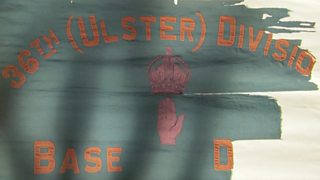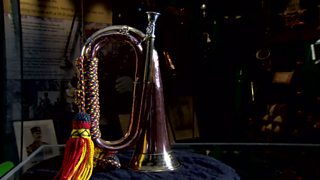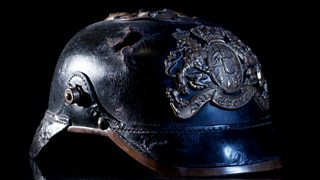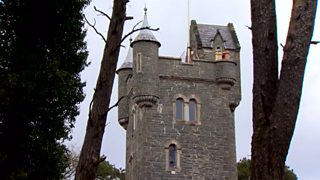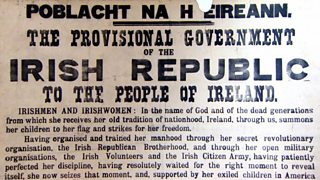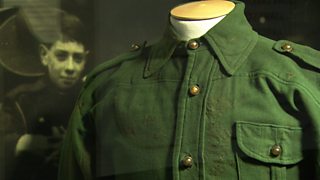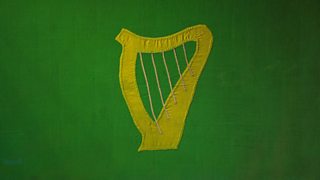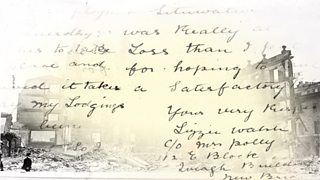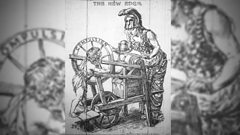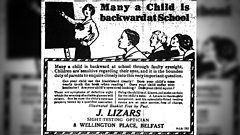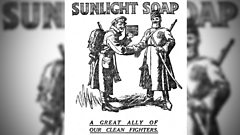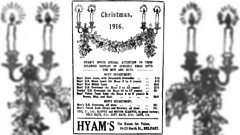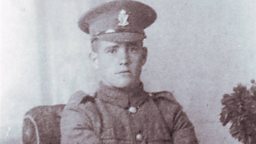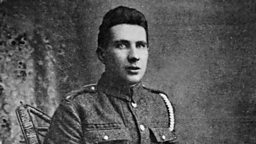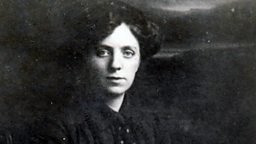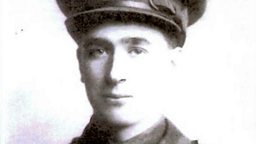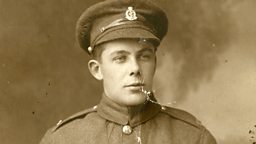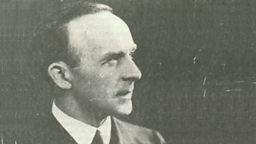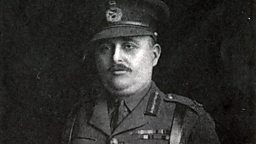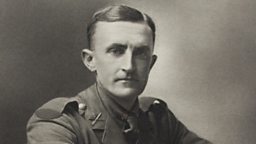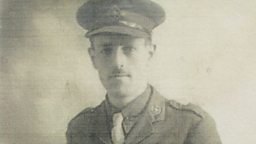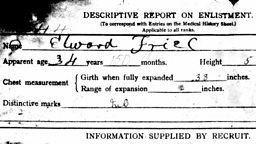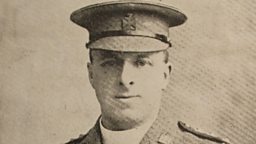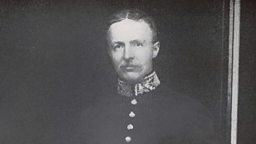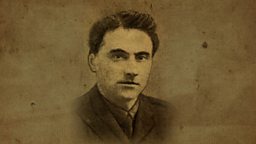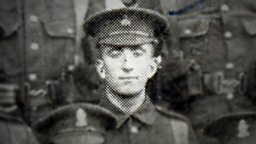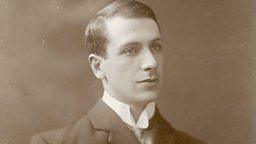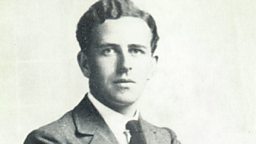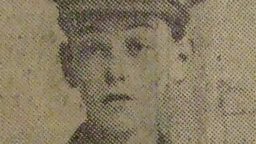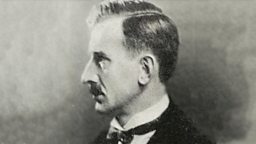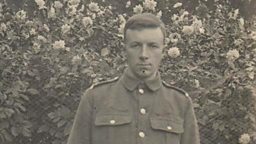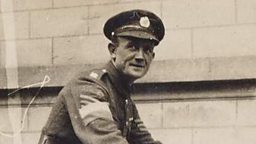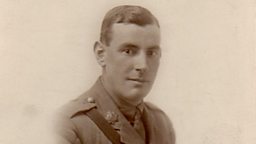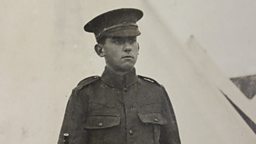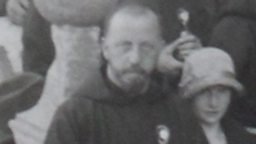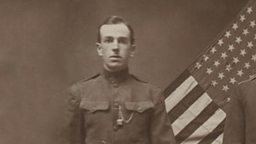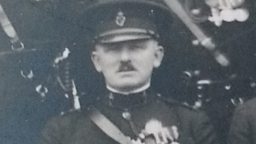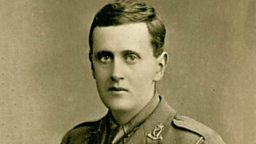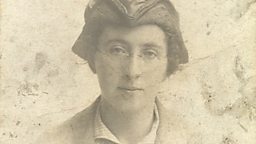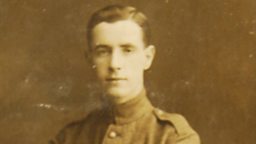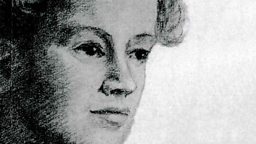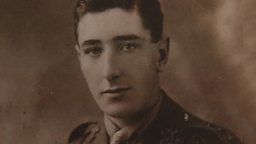Muriel Breen
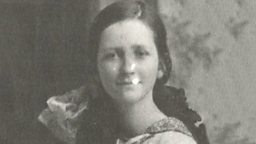
Teenager in World War One
Muriel Breen was born in the last year of the 19th century, and raised in Bangor, a seaside town not far from Belfast.
All the world was balanced on a knife's edge
In her memoir, Liquorice All-sorts, she recalls that her father Joe, a postmaster in Bangor, had a sense of events at the time as historic. He "wanted you to see it with your own eyes", she wrote, and "had a sense of history that was utterly unbiased."
So while family life is firmly centre-stage in her account, forming much of her reminiscences, national and global events are also described as the backdrop to Breen's happy memories of growing up.
Written from her perspective as a young girl, events she describes range from seeing gun-running in Ulster, to being sent to get newspapers as World War One loomed, returning "frightened after being nearly trampled to death in the stampede. People really were news crazy ..."
She is taken to Belfast to see the men off to fight in World War One ("... we cheered and laughed and waved ..."), noting that for some, the gaiety hid sadness: "some women were crying behind the waving handkerchiefs."
Later, "holding back tears", she would recall hearing of the casualties after 1 July 1916, the first day of the Battle of the Somme. But earlier, watching the troops depart for the war, she recalls simply a "wonderful send-off."
"History again", she recollects thinking, "our Dad was really a glutton for it."
Family background
Written very late in her life, Muriel Breen's memoir describes how her father Joseph was from "the South, round Nenagh or somewhere in Tipperary." He joined the Civil Service, and eventually, according to the 1911 Census of Ireland, became a postmaster.
Joseph was "firmly Church of Ireland", Breen says, "by nature a religious man and was to remain so all his life." He also had "great inner goodness and wonderful sense of humour" and was "completely unbiased politically. In all my life I never heard him run anyone down."
Breen's mother, Elizabeth Booth, was from "a long line of Tyrone farmers", and a "wonderful story-teller" who would "entertain us till her voice wore out."
Meeting and marrying, the couple raised a family of three girls, Muriel, Anne ('Nan') and Helen, in Bangor by the sea. Together, she says, "we had few rows and as a family were close knit. Tell-tales were taboo and we settled our differences between ourselves. We aided and sheltered each other on the whole."
Growing up
Breen's recollections of her childhood and teen years are warm and affectionate.
Though "money was always important in our family", Breen remembers magical Christmases, dances and dancing classes, and funds being found for music and elocution lessons.
There were carefree holidays in County Tyrone; Breen's mother brought her once to 'the Field' on 12 July, though her father did not belong to the Orange Order: "maybe we’d come because they wanted to see what it was like."
Her father she describes as very curious: "'There's no use in walking up a road with your eyes straight ahead', he would constantly say. 'Look to the left and right. Be observant and you never know what you'll find'."
But, she writes, as the years passed in this new century, they were becoming aware that, despite their own happiness, they "were getting old enough to know that there were strange things going on in our midst."
Home Rule
"All was not peace and tranquillity", Breen recalls. "Home Rule was at the bottom of it and Ulster would have none of it. A new name was on everyone's lips – Sir Edward Carson a Dubliner and a barrister. There were meetings everywhere and when he was to speak the response was phenomenal."
Then, she writes, "the South was in turmoil too." They received letters "about a man called Larkin who was rallying the ill-paid workers", so that "... what with Home Rule, Rome Rule, Mr Larkin, and Mr de Valera, Sir Edward Carson, Sir James Craig and Galloper Smith, who became the great Lord Birkenhead, things were in a mess."
From her youthful perspective, she says, "we weren't greatly concerned but took in more than anybody realised."
Gun-running
Then, "one night in 1912, I was awakened and an eiderdown was thrown round me", Breen says.
"Dad whispered 'I want you to see something, Muriel'. ... It was the middle of the night, yet a continuous stream of vehicles, nose-to-tail, was speeding past our house into the darkness beyond ... every kind of vehicle ... There wasn't a soul in sight, nothing but this endless procession."
Muriel writes: "'What are they doing?' I asked. 'Shh! Gun-running', Dad whispered. ... 'It's strictly against the law, and yet all those men are bringing guns into the country. To all parts of Ulster. Look at them speeding into the darkness with their illegal loads'. He sighed sadly. 'But what for?', I asked. 'To protect themselves and Ulster'."
She says her father told her there was "a man at our front door who won't let me out. Nobody's allowed out tonight." And went on: "... it's history", telling her "... I wanted you to see it with your own eyes."
Breen reflected: "It gave me a funny feeling. I knew that all the young men and boys had been training for months, just like soldiers. And they had real soldiers to teach them. But now they had real guns and ammunition too. What next? Would there be war in our own country?"
Ulster Covenant
Breen subsequently writes of "the enormous meeting in Belfast."
During it, she recalled, "thousands and thousands of men came to the City Hall to sign the Covenant. I wasn't sure then what the Covenant was. But it had something to do with No Home Rule and loyalty to King and Country, and that meant King George V in London."
She continues, "some of the Covenanters were meant to have signed in their own blood, which was creepy. And all over Ulster, in every town and village, people took pledges to be true."
Breen recalls her own young understanding of events: "After all that the British Government decided to enforce their will and introduce Home Rule. A British regiment stationed at the Curragh, near Dublin, was ordered to march on Ulster and subdue this rebellious people. Carson's army was ready to repel them. But the British mutinied, I was told, and so avoided bloodshed. It was thrilling."
War clouds gathering
With Breen now a young teenager, she writes, "war clouds were gathering in Europe and Kaiser Bill was the new name on everyone's lips."
Then, she recalls, people became avid for news: "Newspapers were the ordinary way of learning what was going on in the world outside Ireland, outside Ulster, outside Bangor. The Evening Telegraph, our only evening paper, had to come to Bangor by rail. The last edition, the eighth as it was called, was delivered about eight o'clock and poor 'Jeemes' Warden in his paper shop was mobbed. The papers were torn from him by a news-hungry crowd ..."
Breen herself became aware of the seriousness of events: "We children were sent once or twice and returned empty-handed and frightened after being nearly trampled to death in the stampede. People really were news crazy and no wonder. All the world was balanced on a knife's edge."
World War One
War and enlistment
Breen writes of the outbreak of war in 1914: "People went crazy. Even in Bangor there was rejoicing. They'd teach the Germans a lesson. Give Kaiser Bill a bloody nose and serve him jolly well right."
Change, Breen recalls, immediately came close to home: "All the boys and men in the shops and stored and farm houses all over Ulster enlisted. They had formed Carson's Army and were more than half trained already at Clandeboye ... They knew such a lot, or thought they did. Youth and enthusiasm were the key words."
Soon, she writes, "the cities, towns and villages of Ulster were bereft but proud. Many young men enlisted from the south too, but they had their own regiments ..."
'Happy band of brothers'
Then came the day when troops departed for the war and, says Breen, "we children were taken to Belfast to see them off."
Of the soldiers, she writes: "Even to this day I can see them: the young and the brave, the short and the tall, the plain and the handsome, the rich man's son and the farm labourer, all marching together. A happy, happy band of brothers, thousands and thousands of them I can hear the bands. I can see the flags. I remember the windows along the route packed with people and flags and more flags."
Standing "on the pavement, children in front", she saw the troops "all laughing and waving to people, cocky and funny and singing, 'It's a long, long way to Tipperary' ..." And, she remembers, "we cheered and laughed, and waved too. It was a great, brave, wonderful send-off ..."
But, she says, "some women were crying behind the waving handkerchiefs."
And "as the soldiers crowded to the rails of the ships for last sight of those dirty docks", she wondered, "what were those merry, laughing, waving boys thinking?"
War in Bangor
"The War was to change things drastically", Breen says, "but in Bangor change came slowly."
She noticed that "more and more soldiers appeared on our streets. They wore ill-fitting coarse Khaki uniforms and puttees and ugly clog-like army boots."
Some were English, and "the Ulster people were kind to them and took them into their homes. After all, they were somebody's sons away from home for the first time."
Breen herself volunteered at a teetotal club for the recruits, washing dishes, though her mother initially objected: "Young girls then were never allowed out alone, especially in the evening. But there was a war on." Allowed to go "on the understanding that I had no contact with soldiers", Breen finally got to go for two evenings a week: "I was thrilled. It was better than knitting."
Finding dishwashing dull, "boredom set in", and she began to go to the main hall: "It was packed with smoking soldiers ... The poor things were trying to enjoy themselves. Some played tiddliwinks, some wrote letters, some played cards or ping-pong, or some just sat ... someone went to the piano and a sing-song started ..."
Meeting a "small young soldier" there, Breen "walked out for the first time", but her father became suspicious. The soldier was allowed home with her, but the dalliance did not last, and she writes, "my dishwashing days were at an end."
News from the front
Sunday, Breen says, was a "day for visitors in our house." Her father would bring hungry curates and local boys back from Evening Service for tea, followed by a music, including war songs: "One began, 'A long, long trail a winding' ... and another was 'Roses of Picardy.' We didn’t know much about 'Mademoiselle from Armentieres'. But it was such fun ..."
Reports from the war began to filter back: "The news from the front was bad ... Bangor families kept hoping that the all too familiar telegram wouldn't be delivered to their door. But they hoped in vain."
Breen says: "Every Evensong ended with the Rector reading the names of the latest victims from the chancel. When he finished the organ clashed out with great chords and shivers ran down one's back. 'The Dead March in Saul' or 'Flowers of the Forest' brought ready tears. Mr Jones, the organist, gave his best and was good. 'He had to fortify himself for the weekly ordeal', people said."
She recalls one particularly difficult Sunday evening, when "the names of my Sunday School teacher's three brothers were read out, one after the other. The youngest was only eighteen. That was a terrible evening."
36th (Ulster) Division 'practically wiped out'
Then came 1 July 1916, the first day of the Battle of the Somme.
Breen writes that afterwards, "it was rumoured that the Ulster Division was practically wiped out. That Sunday evening, name after name was read out by the Rector. There wasn't a dry eye in the house. The dead truly marched in Saul that evening."
It was, recalls Breen, a "sad and tearful little party that trailed home." Her mother, who "hardly ever went to church", awaited the news; "'He read out a long list', I said, holding back tears."
To the astonishment of their gathering, her mother then served the family "a soup plate of porridge", Breen remembers. "How could she shame us like this?" But, she writes, her mother was "deadly serious", explaining that "it was penitential."
"Our boys are dead", her mother said. "Thousands of them. I just can't bear to think of it. I had to make some gesture."
Playing music and singing that night, "it wasn't the same. Before long on that sad Sunday evening we were singing hymns and Mum was crying openly. We finished up with, 'Oh, God our help in ages past'."
Then, Breen says, "dad started the National Anthem, 'God save our gracious King, God save our King'. Everyone joined in. I'll never forget the fervour of it. As I went to sleep that night, the faraway Lambeg drums were beating out their own sad farewell."
'A sort of blur'
The rest of the war passed, Breen recalls, in "a sort of blur. Life went on, as it always does."
At that "awkward age – past the little girl stage, but not yet young ladies", she and her sisters were fascinated by the young soldiers, she says, who "thronged the streets in the periods of time when they were released from their barracks ... They all looked exactly the same in their badly cut, unattractive khaki ... We three girls gave them the 'once over' at intervals. From behind the lace curtains of the drawing room windows we had a good view and heated discussions as to which was the best or worst of the bunch. We got a lot of fun out of it."
She describes how: "These boys were the latest that could be scraped up from England, Scotland, Wales. Country yokels, or the smarter townees, a motley crowd, all herded together and recruited to fill the great empty gaps left by the dead."
Breen remembers that, "inevitably, they began shouting back at us and whistling", but "that was as far as it went ... Because of the class system we were quite unattainable and in an ivory tower. Finally they gave us up as a bad job ..."
A motor car in Bangor
Muriel and her sister eventually did get to meet two English soldiers, friends from Sandhurst, of whom their parents approved.
The sisters were taken aback to discover the soldiers driving up in a two-seater car: "Cars were only just beginning to be seen on the streets and were owned by only a few people ... Our whole family went down to the street to see it."
After a time, "a crowd had gathered round it. It was a curiosity in Bangor."
The soldier were allowed to take the sisters on a drive: "The crowds stood back and allowed us to ascend. Tony was driving and after many puffings and blowings and false starts, we finally moved off amidst a rousing cheer. We gathered speed going down the main street and people stood to stare."
She found: "The car was quite high and open to every breeze ... we hooted and tooted at every street corner and reduced speed to walking rate at the corners. With our scarves flying and horn tooting we made almost a royal appearance."
Overall, "we were thrilled and maybe a little scared as well – our very first drive in a real motor car."
On their return, Breen's mother "was looking anxiously out the window", and greeted them saying "darlings, I was so worried."
"You'd think we’d been to the North Pole", Breen says. "It was embarrassing." Despite their best efforts with her mother, "nothing would persuade her to put a foot in the thing."
Drives became a regular event thereafter, though Breen believed, "sooner or later the boys would be sent 'overseas' ..."
'To the awful, bloody Front'
Muriel Breen's young man subsequently departed for the war, as did her sister Nan's: "And so off they went to the awful, bloody Front. The war seemed to be getting more vicious in its final stages."
They received bad news: "Nan's boy was killed by a stray bullet soon after they landed. It was a freak accident, but somehow typical of all that stupid waste."
Breen herself "had to endure months of anxiety ... I heard nothing."
The war ends
Breen recalls, "then, suddenly, the war was over."
"Little Bangor was the same as everywhere else. People went wild with excitement. They didn't know whether to laugh or cry. The lights went up and the bands played. We were on the streets with everyone else, dancing and kissing strangers."
Her young man returned, but "the War had changed him. Also the loss of his friend ... it was a much quieter Tony who presented himself in due course at our house. It was a joyful reunion, of course, and my family treated him like a hero."
Following a "brief interlude of innocent romance", he returned to Egypt via London with his regiment. "There were fond farewells and promises of eternal devotion, which we both sincerely meant."
But the wartime romance did not last, and Breen said of it: "I was not heartbroken."
After the war
Few careers open to women
"The First World War", Breen notes, "changed everything. More than anything, it brought about the liberation of women. They had to take men's places in factories, so up went the skirts and off went the hair. The suffragettes had fought for the vote and this was now granted."
But, she reflects, "I have to admit, that movement passed me by. It just didn't get to Bangor and anyway my father thought it silly. Besides I was far too frivolous to take any notice of it. I was only interested in having fun."
She recalls that "the whole world seemed to be dancing ... Girls wore short skirts and carried long cigarette holders ... youth was breaking out all over. The post war generation was 'rarin' to go' and we were carried along with it willy nilly. Idiotic songs were on everyone's lips ..."
Nonetheless, at home "there was outraged shock when I had my long brown hair cut off."
And still, "there were only a few careers open to women: teaching, medicine, or secretarial work. You could also be a companion. It had to be something ladylike, a concept that held no interest for me. A few girls went to Queens University, but they wanted to be teachers or doctors, which I didn't. So, my parents wisely decided I wasn't university material. They probably thought optimistically 'Oh, she'll get married and live happily ever after'."
'A new woman'
"In the meantime", says Breen, for her "a banking career was decided on."
She writes: "Banks were then opening up to female employees for the first time, due to the shortage of manpower caused by the war."
Now in her late teens, Breen passed an interview at the Ulster Bank in Belfast, the bank being "considered a good career for girls." But she recalls, "we were a rarity and kept very much in the background ..."
The decision was made that she would commute to Belfast, "the only stricture was that I had to travel first class. There could be no mixing with the plebs in second class – the more popular one for my age group apparently ..."
Her parents worried, "but I loved it. I was a new woman, one of the first to work for a living. I'm sure it was very menial work, and the hours were long, but I got real money for it ... I assumed a new status in my own estimation ..."
After a time, she began to travel to work temporarily at other bank branches, in Clones and Lurgan, before being appointed permanently to Donaghadee, where "the few who came in gaped at me. A girl, a young girl in a bank. Who ever heard of such a thing?"
Girl on a motorbike
To get to Donaghadee, "someone came up with the idea of a motor bicycle. Although nobody had ever seen or heard of a girl on a motor bicycle, the idea had its merits."
Breen acquired a New Imperial, she says, and "it terrified me. I could hardly ride an ordinary bike."
Her sisters "would laugh riotously when I appeared dressed in an ensemble of waterproof trousers and jacket, a peaked cap and gauntlet gloves."
Out on the roads, "I began to be a source of local interest. People watched out to wave and laugh at me. Let's face it, there wasn't much else to look at. But a girl on a motor bicycle was a phenomenon."
However, Breen had a bad accident on the motorbike, leaving her deaf in one ear, and requiring long recuperation. After that, she wrote, "never again would I ride on a motor bicycle."
Departure for London
While Muriel Breen was still in her twenties, her father, mother and sister Helen each became ill and died within the space of a few short years. Her other sister married and had a family.
Breen, now in Belfast to which the family had transferred after he father's death, felt that "a wide empty blank faced me."
Marriage was, she says "a career for girls", and Breen herself had earlier had serious relationships, and a proposal of marriage, which she refused.
She "had reached the goal of a girl's life – marriage. But it stuck in my gullet. Why did one have to get married?" In general, Breen says she felt "marriage still had no place in my immediate life." But she also believed "there was no place in the present family structure for me. I was a single woman, a maiden aunt ... the age of absolute freedom for ordinary women had not arrived. We were still tied to the family."
But then came the offer of a job in London with the bank. "I was walking on air", she recalled.
She was now "bound for a club for Professional Ladies in Vincent Square, London. Me, a professional lady? What a hoot."
Subsequent life
With her departure for London, Breen's memoir ends.
She went on to live in London for a number of years, and then to Belfast, where she became friends with many in the artistic community.
Breen later moved Dublin, where she eventually died in 1996. Having enjoyed writing all her life, she saw her memoir, Liquorice All-sorts, published in 1993. This included a poem, Acrostic for a Lady, written for her by Seamus Heaney.
These pages are based on personal testimonies and contemporaneous accounts. They reflect how people saw things at that time and are not meant to be a definitive history of the period.
Voices 16 objects
Voices 16 galleries
Credits
Thanks to the family of Muriel Breen, and to Mary Rose Callaghan.
Muriel Breen's memoir, Liquorice All-sorts: A Girl Growing Up, was published in 1993 by Moytura Press, Dublin.
